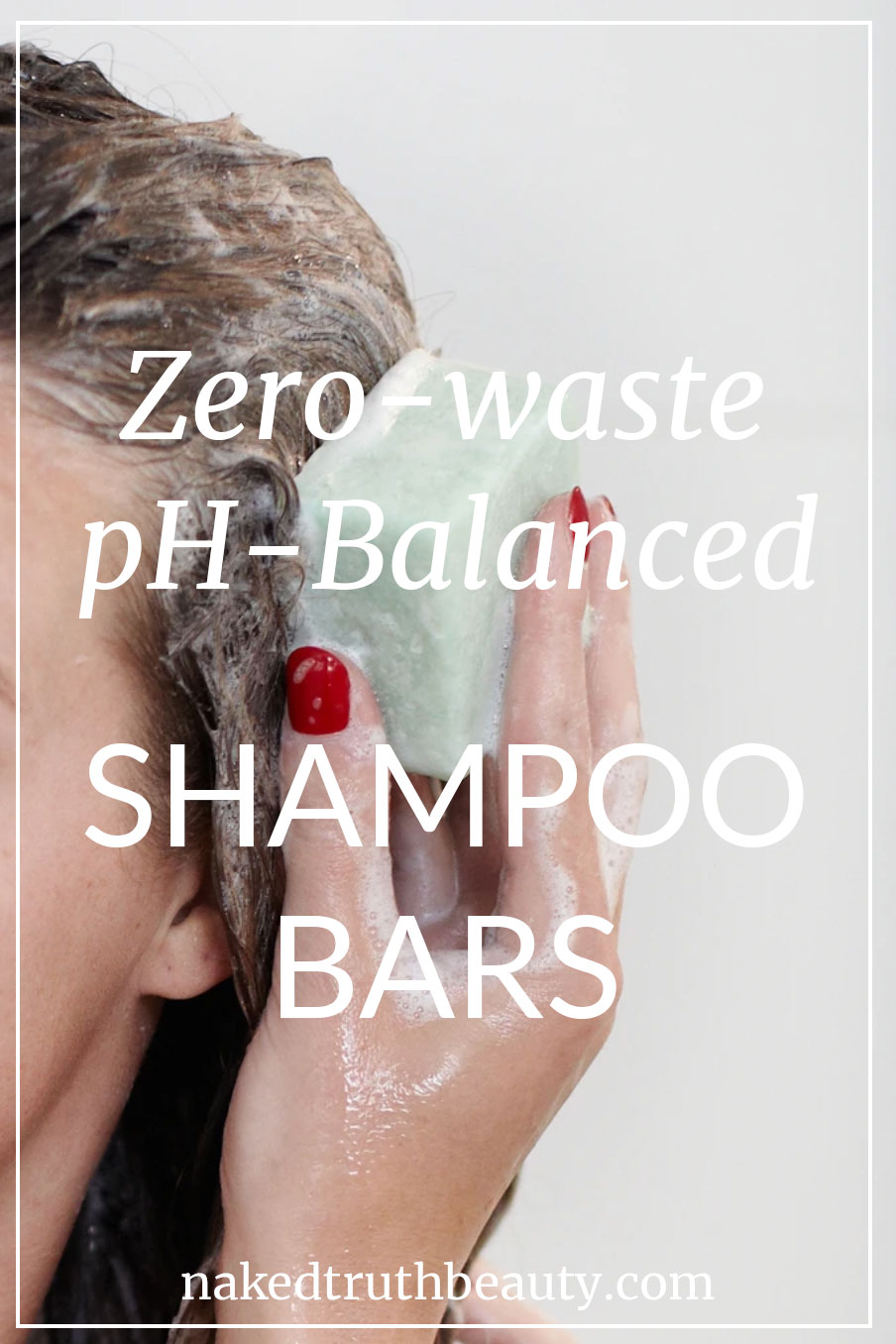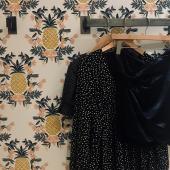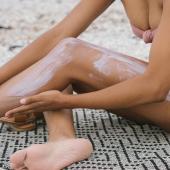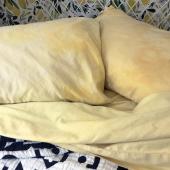Zero-waste, pH-balanced shampoo bars
In a world that created The Great Pacific Garbage Patch, a plastic trash island twice the size of Texas, it's about time that zero-waste products get some buzz.
The humble shampoo bar is one such item that's getting attention for this very reason. These solid, waterless cleansing bars are essentially packaging-free (or they should be), needing only a simple paper box or wrapping to hit shelves. That's a serious win considering 80 billion plastic bottles go to landfills every year from shampoo and conditioner bottles alone.
…but
Though shampoo bars seem like an answer to at least a small fraction of our world-crippling waste habit, the vast majority of shampoo bars are not actually a good shampoo solution. This is because most are little more than glorified bars of soap – a pH nightmare for hair (more on hair pH here).
Soap-based shampoo bars are created by saponifying oils and/or fats, as by adding lye (sodium hydroxide). Though none of the alkali remains in properly made product, the resulting soap is basic (about a 9) on the pH scale, and no quantity of nourishing oils or pH adjusters (like citric acid) is going to bring that down to a place of hair happiness. It's just not a thing.
In order for soap to be good for hair, it needs to be about a 5 on the pH scale. As far as shampoo bars go, that means they've got to be a whole new thing that's not really soap at all.
Enter, Ethique.
How Ethique is Different
When looking for "clean" beauty products, we're often (understandably) looking for a short, easy-to-read ingredients list. For this reason, we skip the Pantene Pro-V, which boasts a mile-long list with ingredients like propylparaben and DMDM Hydantoin (releaser of formaldehyde), and reach instead for shampoo bars like J.R. Liggett's, the actual ingredients label for which is a beauty to behold: Saponified Olive Oil, Coconut Oil, Castor Oil and Rice Bran Oil; Mango Butter, Organic Virgin Coconut Oil, Vit. E, Aloe Vera, and Almond Oil.
While the simple-is-better strategy is usually a good one, it overlooks an important maxim:
"Just because it's natural doesn't mean it's good for you, and just because it's synthetic doesn't mean it's bad for you."
In the case of shampoo – as far as usefulness is concerned – non-toxic synthetics are actually the keys to happiness. This is not to say that bars like J.R. Liggett's are "bad" – they're not – but unless you have thick, resilient, straight hair, soap based bars are not going to make your hair happy (I wish I didn't speak from experience).
The way to have the best of both worlds (that is, a waste-free shampoo bar AND happy hair) is to opt for a bar that's really just solid, waterless shampoo, which is exactly what Ethique is. Plus, I pH tested it, and it's a hair-perfect 4.5. Hallelujah!
Now, when you look at the Ethique label, most of the ingredients are going to be foreign. That's ok! Synthetics (or ingredients derived from natural sources, as many of Ethique's are) can be your friend. However, because I believe we each deserve to make our own decisions, I've put all of the ingredients for Ethique's Pinkalicious Shampoo Bar for Normal Hair in a handy little table at the bottom of this post. Please note that this table lists the ingredients as seen on the label, meaning from highest concentrations to the lowest. This is particularly important when evaluating the presence of less-desirable ingredients.
What the ingredients mean
Now, before you freak out that the product as a whole is a 3 on EWG, let's delve into why.
When looking at an ingredients list, we're often looking for the absence of certain ingredients without devoting the same attention to evaluating what's been included instead. This is a serious oversight because what's swapped in for an easily recognized "bad" ingredient may not be better (more on this another time).
What I'm saying is: Just because the ingredient you don't like is gone does not mean there's not a different unsavory chemical doing the same job. Likewise, if there's an ingredient present that you're less than jazzed about, think about what it may be replacing. For example, Ethique uses lactic acid to lower to pH, both for hair health and to create a hostile environment for bacteria in order to avoid using harsher, toxic preservatives.
Overall, please remember that shampoo is not found in the wild, and there are always tradeoffs.
The Review
I've been using Ethique's Pinkalicious Shampoo Bar for Normal Hair and The Guardian conditioner bar since May. That was 9 months ago, and I've only just hit the end of the shampoo bar (there were times — I'll admit — that I over-lathered), and the conditioner bar feels like it's going to last forever. Ethique's site says their bars last 2-5 times longer than bottled products, and I believe them. Depending on your use, these bars can easily last a whole year!
As far as a review goes, I don't have much to say because Ethique is great. It lathers like crazy (which is very satisfying) and does its job. In fact, I like it much more than my previous hair care (Acure) because it leaves my hair feeling more moisturized and more voluminous – double win. There's also no weird residue like with some other natural products. And, again, it's a beatifully pH-balanced 4.5. Love it.
The only cons I have for these products are that 1) It can take a bit longer to apply (I like to rub the bar against my hair, but remember that less is more – it lathers so well once it hits water that you need less than you think), 2) The shampoo can leave my hair feeling squeaky clean (which I don't particularly like) if I use too much (easily remedied with conditioner), and 3) It's not so easy to store if you have a small shower like I do. A storage container (Amazon link) is an absolute must for keeping the bars dry (they'll disintegrate and last less long if they get wet outside of use).
In addition to being great hair care, pH balanced, and color safe, Ethique:
- Uses biodegradable ingredients and compostable packaging so the products leave no trace.
- Uses zero palm oil or palm-derived ingredients (I really appreciate their thoughtful palm oil commentary. Read it here.)
- Is New Zealand's (where they're based) highest scoring B Corp, primarily because it's Carbon-neutral and a Living-wage employer.
- Is 100% plant-based (no petroleum by-products)
- Is 100% vegan
- Founded and run by Brianne West, a badass female scientist and entrepreneur
- Has stopped an estimated 5 million plastic bottles from landfills to date.
- Donates a whopping 20% of profits to charities fighting to protect the planet. That's huge, especially in an industry with razor-thin margins.
They're working hard to do the right things and to be a dark green option. It gives me joy to support them.
What I'm using
Ethique's Pinkalicious Shampoo Bar for Normal Hair
Next, I'm going to try Damage Control Shampoo Bar.
If you're not sure, check out one of their Sampler Packs.
Notes: For a long time, Ethique was only available online through Amazon, but they're now shipping to the U.S. (and 64 other tracked countries) from their home site, Ethique.com! Yay! In addition to doing your all to support them by buying directly from the company, the Ethique site offers fun items not available on Amazon, like new products and the most adorable little Minis. However, shipping is $20 to the U.S., so it would be nice to bundle with a friend.
I've also recently come across Unwrapped Life, out of Calgary, and I'm excited to try their stuff. It'd be nice to find a bar a bit closer to home for the shipping carbon footprint.
|
Ingredient |
What it does |
EWG Rating |
Notes |
|---|---|---|---|
|
Sodium cocoyl isethionate |
This coconut-derived, palm-free surfactant turns this bar into shampoo by allowing oil and water to emulsify (mix) and create a lather. It's biodegradable and a gentle surfactant. |
1 |
|
|
decyl glucoside |
This ultra gentle surfactant is derived from coconut and sugar. It's biodegradable and palm free. |
1 |
|
|
sodium coco-sulfate |
This surfactant is used as an alternative to sodium lauryl sulfate (SLS), and is less harsh on skin and hair. Ethique's SCS is derived from coconut oil and is palm free and biodegradable. |
1 |
|
|
creamed Cocos nucifera (coconut) butter |
Creamed coconut butter moisturizes and softens the skin, and thickens the shampoo bar so it holds its shape in your bathroom. This butter is made from pacific islands coconut flesh. |
1 |
|
|
stearic acid |
Stearic acid thickens and hardens. Ethique stands out for using palm-free stearic acid, opting instead for rice-, coconut-, or olive-derived options (depending on the season). It's biodegradable, too. |
1 |
This is non-toxic, but is often derived from palm oil. If you see it on a label, try to find proof from the manufacturer that they're purchasing from an alternate source. |
|
Theobroma cacao (cocoa) butter |
Cocoa butter is a lot like coconut butter: It softens, hydrates, and thickens. This butter is sustainably sourced from cocoa beans, and is biodegradable. |
1 |
Ethical sourcing of cocoa butter is tough. Look for the company to be transparent about its supply chain. Ethique works with multiple suppliers, including CONACADO cooperative in the Dominican Republic, with whom TradeAid work. |
|
caprylic/capric triglyceride |
Caprylic/capric triglyceride is a light weight emollient that locks moisture in. Ethique's is coconut derived (palm free) and biodegradable. |
1 |
|
|
cetyl alcohol |
Depending on the season, Ethique uses cetyl alcohol from coconut, rice bran, or sugarcane. This ingredient is a "fatty" alcohol that is an emollient (softener and hydrator) and thickener. |
1 |
|
|
stearyl alcohol |
Stearyl alcohol is also considered to be a "fatty" alcohol, and is used for its emollient and thickening properties. Ethique's is derived from coconut, rice bran, or sugarcane, depending on the season and availability. |
1 |
|
|
Behentrimonium methosulphate |
BTMS is derived from Rapeseed/colza oil (a mustard crop grown for its seeds that features bright yellow flower) and is used in hair formulas for its conditioning, detangling, and emulsifying properties. This ingredient is ubiquitous in shampoo and conditioner because it's such a good moisturizer, and it's present here because it's one of chemicals that turns the solid bar into lather. With that said, there's not a ton of research-based information on BMTS (unfortunately, this is not unusual for "clean" beauty), and we'll have to continue evaluating it as more information emerges. To be transparent, it's not my favorite ingredient, but it works, and as far as shampoo-with-positive-results goes, no formula is perfectly "clean." |
4 |
Do not confuse this ingredient with the similarly named Behentrimonium Chloride. |
|
Citrus paradise (pink grapefruit) peel oil |
Pink grapefruit essential oil, added for the delightful smell. The rating on this depends on usage. Like all other citrus essential oils, grapefruit oil is phototoxic, meaning it causes skin to be hyper sensitive to the sun, causing burning. However, assuming this is rinsed off the skin – as shampoo usually is – there's no risk of that here. |
1-3 |
Not to be confused with grapefruit seed extract, which is a bunch of baloney. More on that another time. |
|
Vanilla planifolia (vanilla) oil |
Sustainably sourced from renewable vanilla, it's totally biodegradable, safe, and absolutely delicious smelling. |
1 |
|
|
lactic acid |
Derived from the bacterial fermentation of sugar, lactic acid serves to reduce the pH of the shampoo bar. Ethique's lactic acid is created from sugar instead of coal tar, which is the usual source. This lactic acid is sustainably sourced, biodegradable, and included in a very low concentration that is well-below the recommended, "generally recognized as safe" levels. |
4 |
This is an excellent example of a less-liked ingredient being included to avoid using an even worse ingredient. Lactic acid lowers the pH of the product, making hair happy and creating a hostile environment for bacteria. This means Ethique can avoid using less-intense (and less-desirable) preservatives. |
|
Red mica |
Red mica gives this bar its pretty pink color. |
2 |
The two rating is misleading because the only known hazard for mica is if it's inhaled. In the form of a shampoo bar, that exposure route is impossible. |





